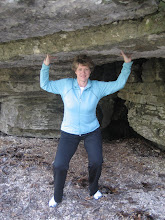
It is with great trepidation that I write this post. Basically, because I know that by doing so I have somehow become accountable and well, it would be much easier not to be. One week ago, I began running. Well, more truthfully---I began walk/running. If you see me run it you might ask yourself, “What’s the point? Her run is not that much faster than her walk.” But I call it “running” just the same. Kent is a runner, my friend Ginny is a runner and I wanted to share this activity with them, so I started to run myself.
Anyway, true to the Marsha approach to everything in life—I READ it to death. Perhaps I thought that by reading about running I would automatically become---well---a runner, and that actually pounding the pavement wouldn’t be necessary. Guess what? It doesn’t work that way.
Ginny recommended “No Need for Speed” by John Bingham and it arrived on my doorstep with in 48 hours just as Amazon promised. Funny thing is, I can’t put it down. Over the past few years, I have read at least 30 books about widowdom, I have read more than 30 books about being a good parent or wife, and many more about dieting; yet, this book on the subject of running has created more challenge in my life than any of the previous reads.
Bingham’s approach to running couldn’t be a more perfect metaphor to how we should approach widowhood and life in general. Let me explain.
With all due respect to Mr. Bingham I am going to analogize some of his writing. I am going to replace “running” (for the most part) with the word “widowhood”; the word “life” would work as well:
“Widowhood is really just one giant game of Chutes and Ladders, though in widowhood there are more chutes than ladders. You make decent progress in your widowhood and then suddenly an “injury” sends you back to where you were 6 months before. So you roll the dice and start again.”
In addition, Bingham writes of the problem many beginning runners face: that of setting unrealistic expectations. He explains that he receives a multitude of emails from folks who feel they “should” be running faster, but are caught in the expectation trap. He clarifies how runners have stopped being happy about the progress they have already made and are trying to live up to some preconceived “standards”. I find this a problem with many folks. They read about another’s journey and expect that they must have the same one and if, for some reason they do not, they feel less or more because they have a different experience.
I like Bingham’s response (once again I am executing literary license in bold print):
“A timetable may be vague, ill defined or a schedule they’ve read or heard about. Whichever it is, they’re certain that they’re falling further and further behind everyday.
Your widowhood won’t confirm to a timetable. It won’t adhere to a schedule that you put on the wall, write down in a journal or read in a grief book. Improvement comes over time. You’ll get stronger and grow further when YOU can---and not a day before.”
I don’t think I have ever read a self-help book that holds such perfect truths for the widowed (or life for that matter), yet it comes in the form of a book about running. I stand amazed at how God reveals truths to us when/if we are open. Following Memorial Day, I have been more mindful of my widow journey. I am not defined by it, but I most certainly am who I am today BECAUSE of it and it continues…










